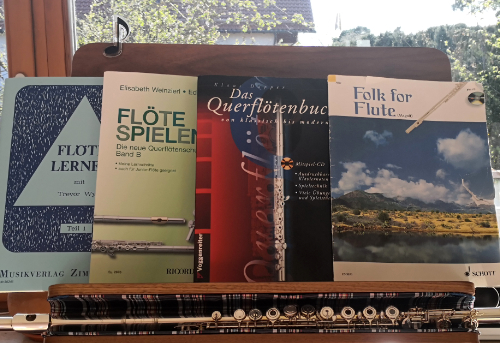July 2022
Now I really haven't had flute lessons for a very long time. Time-wise, it was difficult for my teacher and me to find common dates. Her studies and the young family have priority and my work is also determined with morning, frequent evening and weekend duties. One can certainly understand that this is, in my case, often accompanied by a lack of inner energy.
 Then I took part in a choir week at the beginning of July and unfortunately got infected with Corona there. After recovering, I was quite groggy and powerless for many days and weeks. Therefore, I was not able to assemble the flute, let alone blow into it. I no longer had the strength for it.
Then I took part in a choir week at the beginning of July and unfortunately got infected with Corona there. After recovering, I was quite groggy and powerless for many days and weeks. Therefore, I was not able to assemble the flute, let alone blow into it. I no longer had the strength for it.
Not practising for a long time is not at all good for a flute rookie. She has unlearned many things during this time, for example, a distinct embouchure and the high notes.
The flute teacher is also busy and no lessons took place.
For this reason, I only practise a little and with difficulty. Therefore, there is nothing great to report this month.
Some linguistic aspects about the flute:
In the Middle Ages, the transverse flute was covered by imprecise terms: fistula and pipa in Latin, swegel (which lives on in Slovenian swegla and Croatian zvegla) and pfife in Old High German.
In the twelfth century the first forms of the word flûte appear in French. The word seems to come from the Latin flatus (breath). Flaute is cited with other wind instruments: flagot, flageolet (one-handed flutes), frestel (pan flute), estive, chevrette (bagpipes), chalemel, chalumeau, muse (reed instruments). Flaute, flahute includes both recorder and transverse flute.
Old French: flautes, flöutet, flaüste, flahute
Middle High German: flöite, vloiten, floyten
Provençal: flaustel, flaütz, flaütelt
English: flouter
Italian: flaùti, flaùto, fiautti
Catalan: flaütes
Spanish: flauta


